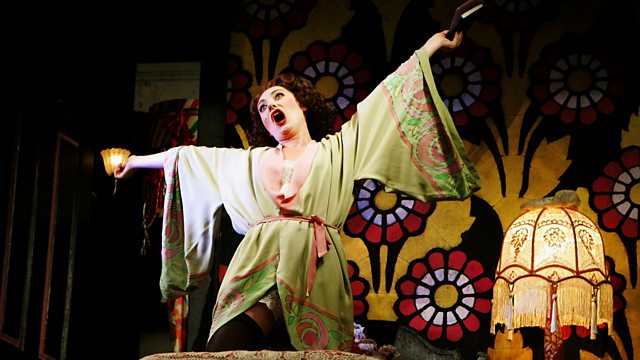
Episode 5
Donald Macleod explores Rossini's operas, as well as two leading composers in the generation before him - Ferdinando Paer and Simon Mayr - little-known now, but famous in their day.
Continuing Donald Macleod's exploration of two centuries of Italian opera from Monteverdi to Rossini. In the final course of this week-long operatic banquet we reach Signor Crescendo himself, Gioacchino Rossini. Rossini is known above all for his dazzling comic masterpiece The Barber of Seville, but like many of his musical forbears he also cultivated his 'serious' side. It's a side that many listeners may be only dimly aware of, and it's never been particularly good box office.
After a shaky start, The Barber became a perennial favourite with audiences. By contrast, the searing tragedy of Ermione just didn't catch on; the opera ran for a handful of nights before the composer withdrew it, after which it went into suspended animation until it was finally revived over a century and a half later. When they met in 1822, Beethoven advised Rossini to stick to comic opera. Ermione proves how wrong he was. We also hear from the two leading composers of Italian opera in the generation before Rossini, Ferdinando Paër and Simon Mayr - as with several of this week's composers, little-known now but major players in their own day.
Last on
More episodes
Next
You are at the last episode
Music Played
-
![]()
Ferdinando Paer
Sofonisba – extract from Act 2, scene 9
Performer: Jennifer Larmore (Sofonisba), Paul Nilon (Siface), Mirco Palazzi (Scipione), Geoffrey Mitchell Choir, Philharmonia Orchestra, Conductor: Marco Guidarini.
- Opera Rara ORR237.
-
Untitled
Music included: O belicoso Dio, del tuo gran tempio; Ah consorte! Ah figli! Addio; Se la patria a me diè vita
![]()
Simon Mayr
L'amor coniugale – extract from scenes 15–16
Performer: Giovanni Bellavia (Moroski), Dariusz Machej (Peters), Cinzia Rizzone (Malvino/Zeliska), Francescantonio Bille (Amorveno), Württemberg Philharmonic Orchestra, Conductor: Christopher Franklin
- Naxos 8.660198-99.
Untitled
Music included: Nell’orror; Quartteto cantabile: Ah voi
![]()
Gioachino Rossini
Il barbieri di Siviglia – extract from Act 1
Performer: Urban Malmberg (Fiorello), Raúl Giménez (Il Conte Almaviva), Håkan Hagegård (Figaro), Choeur du Grand Théâtre de Genève, Orchestre de Chambre de Lausanne, Conductor: Jesus Lopez-Cobos
- Telarc 9031-74885-2.
Untitled
Music included: Piano, pianissimo; Cavatina: Ecco ridente in cielo; Ehi, Fiorello; Recit: Gente indiscreta!; No.2 Cavatina: Largo al factotum
![]()
Gioachino Rossini
Ermione – Act 1 scene 6
Performer: Chris Merritt (Oreste), Cecilia Gasdia (Ermione), Ernesto Palacio (Pirro), Elisabetta Tandura (Cleone & Cefisa), Margarita Zimmermann (Andromaca), William Matteuzzi (Pilade), Mario Bolognesi (Attalo), Simone Alaimo (Fenicio), Prague Philharmonic Chorus, Orchestre Philharmonique de Monte-Carlo, Conductor: Claudio Scimone.
- Erato 2292-45790-2.
Untitled
Music included: Marziale: Alfin l’Eroe da forte; Andante: Sperar poss’io?; Marziale: A me Astianatte
Broadcasts
- Fri 7 May 2010 12:00����ý Radio 3
- Fri 7 May 2010 22:00����ý Radio 3
Beethoven Unleashed – the box set
What was really wrong with Beethoven?
Composers A to Z
Who knew? Five eye-opening stories from Composer of the Week
Five reasons why we love Parry's Jerusalem
What is the strange power of Jerusalem which makes strong men weep?
A man out of time – why Parry's music and ideas were at odds with his image...
The composer of Jerusalem was very far from the conservative figure his image suggests.
Composer Help Page
Find resources and contacts for composers from within the classical music industry.





